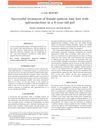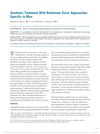 26 citations,
April 2009 in “Australasian Journal of Dermatology”
26 citations,
April 2009 in “Australasian Journal of Dermatology” Spironolactone successfully treated hair loss in a 9-year-old girl.
[object Object]  14 citations,
October 2021 in “Journal of Pediatric and Adolescent Gynecology”
14 citations,
October 2021 in “Journal of Pediatric and Adolescent Gynecology” In teens with Polycystic Ovary Syndrome and obesity, issues related to metabolism, skin, and mental health are common, and a clinic with various specialists can provide care for most of these problems.
14 citations,
January 2016 in “International Journal of Trichology” Many women with hair loss also have thyroid issues, high blood pressure, and low Vitamin D.
 9 citations,
March 2022 in “Journal of the Endocrine Society”
9 citations,
March 2022 in “Journal of the Endocrine Society” Girls with PCOS have higher levels of certain androgens, which are linked to excess hair growth, but these androgens don't help diagnose PCOS.
May 2021 in “Journal of the Endocrine Society” Adolescents with PCOS have higher levels of certain androgens, which are linked to hair growth but don't help diagnose PCOS better than testosterone levels.
 September 2018 in “Plastic and Reconstructive Surgery – Global Open”
September 2018 in “Plastic and Reconstructive Surgery – Global Open” Using real-time ultrasound during gluteal fat grafting is safe and reduces complication risks.
 2295 citations,
August 2012 in “The international journal of transgenderism/International journal of transgenderism”
2295 citations,
August 2012 in “The international journal of transgenderism/International journal of transgenderism” The guidelines recommend informed consent for gender-affirming treatments and stress the importance of personalized, culturally sensitive care for transgender individuals.
 175 citations,
November 2009 in “PLOS ONE”
175 citations,
November 2009 in “PLOS ONE” Women look young for their age due to larger lips, less sun damage, and genes that prevent gray hair and wrinkles.
56 citations,
December 2010 in “The journal of investigative dermatology/Journal of investigative dermatology” Hair follicle cells age faster and lose pigment due to less catalase, causing hair to turn gray.
35 citations,
March 1976 in “British Journal of Dermatology” No clear link was found between hair follicle mites and skin conditions in Australian Aborigines.
 19 citations,
September 2011 in “Seminars in Cutaneous Medicine and Surgery”
19 citations,
September 2011 in “Seminars in Cutaneous Medicine and Surgery” At-home laser and light skin devices are less effective than professional ones, with limited scientific evaluation, but some show promise for wrinkles, hair growth, and acne.
 12 citations,
November 1987 in “Pediatric dermatology”
12 citations,
November 1987 in “Pediatric dermatology” Four children had unmanageable pale blond hair due to uncombable-hair syndrome.
11 citations,
September 2016 in “Archives of Dermatological Research” People with denser forearm hair have a higher risk of certain skin cancers.
10 citations,
March 2019 in “Journal of neuroendocrinology” Testosterone affects stress hormone levels differently in adolescent and adult male rats.
 10 citations,
January 2015 in “Journal of Cutaneous Medicine and Surgery”
10 citations,
January 2015 in “Journal of Cutaneous Medicine and Surgery” Cold caps and certain drugs may help prevent or reduce hair loss from chemotherapy, but more research is needed.
 8 citations,
October 2017 in “Dermatologic Surgery”
8 citations,
October 2017 in “Dermatologic Surgery” Men need higher doses and tailored injection techniques for botulinum toxin treatments due to their unique facial features.
 7 citations,
March 2019 in “Cancer Epidemiology, Biomarkers & Prevention”
7 citations,
March 2019 in “Cancer Epidemiology, Biomarkers & Prevention” Finasteride use is not clearly linked to an increased risk of male breast cancer.
 3 citations,
February 2016 in “Scandinavian journal of urology”
3 citations,
February 2016 in “Scandinavian journal of urology” Finasteride use varies among Denmark, Finland, Norway, and Sweden, with higher usage in Finland and Sweden.
 1 citations,
November 2001 in “British Journal of Dermatology”
1 citations,
November 2001 in “British Journal of Dermatology” Oral cyclosporin doesn't stop hair loss.
 April 2023 in “Journal of Investigative Dermatology”
April 2023 in “Journal of Investigative Dermatology” Wildfire air pollution is linked to more online searches and clinic visits for psoriasis in adults after a delay.
 December 2022 in “bioRxiv (Cold Spring Harbor Laboratory)”
December 2022 in “bioRxiv (Cold Spring Harbor Laboratory)” MicroRNA-205 helps hair grow by changing the stiffness and contraction of hair follicle cells.
January 2022 in “JAAD case reports” Granulomatous alopecia areata is a rare but real form of hair loss.
 October 2018 in “International journal of reproduction, contraception, obstetrics and gynecology”
October 2018 in “International journal of reproduction, contraception, obstetrics and gynecology” Most adult women with PCOS in Port Harcourt, Nigeria, have high levels of bad fats in their blood, especially younger women.
 October 2018 in “International journal of reproduction, contraception, obstetrics and gynecology”
October 2018 in “International journal of reproduction, contraception, obstetrics and gynecology” Higher testosterone levels in Nigerian women with PCOS are linked to glucose disorders like diabetes.
[object Object]  April 2018 in “Journal of Investigative Dermatology”
April 2018 in “Journal of Investigative Dermatology” Dsg1 is essential for maintaining a healthy skin barrier in mice.
 December 2012 in “Faculty Opinions – Post-Publication Peer Review of the Biomedical Literature”
December 2012 in “Faculty Opinions – Post-Publication Peer Review of the Biomedical Literature” The conclusion is that the dermal papilla is crucial for hair follicle regrowth, and hair follicles undergo significant structural changes in addition to cell division during regeneration.
 July 2008 in “British Journal of Dermatology”
July 2008 in “British Journal of Dermatology” Cyclosporin doesn't stop hair loss.
 1 citations,
March 2004 in “Journal of the American Academy of Dermatology”
1 citations,
March 2004 in “Journal of the American Academy of Dermatology” ZD1839, a cancer drug, can cause mild skin rashes that are treatable without stopping the medication.
 October 2017 in “The American journal of gastroenterology”
October 2017 in “The American journal of gastroenterology” Three patients suffered severe health issues due to not getting enough vitamins and minerals after weight-loss surgery.
 90 citations,
October 1983 in “British Journal of Dermatology”
90 citations,
October 1983 in “British Journal of Dermatology” The unit area trichogram is a reliable method to assess hair loss and treatment response in people with androgenic alopecia by measuring hair density and thickness.























